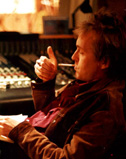
Comment
on this story
What:
Chuck Prophet with Caitlyn Cary
When:
Thursday, Oct. 3, 10 p.m.
Where:
Blue Cats
Cost:
$10
|
|

Former Green on Red guitarist suddenly rides a small wave of fame and fortune
by Kurt Hernon
It seems like," says a weary sounding, gravel-voiced Chuck Prophet, "we finally caught some sort of wave or something." Prophet, talking about the relative measure of success that his latest record, No Other Love, has inadvertently garnered, sounds appreciative but hardly grateful. His self-assured rumble of a voice is warmed by such laissez-faire matter-of-factness that it's clear that Prophet is bemusedly wondering exactly why it took so long for this little wave to finally roll in.
"It's not like we shed any more blood making this record than we've ever done before," he explains. "But somehow this one caught a few more ears."
Somehow indeed! And if any of Divine Providence's many prescient whores—fate, happenstance, chance, luck—have had anything to do with the newfound glories that Chuck Prophet is now enjoying, so be it. He has earned their glorious pleasures.
When Green on Red first popped up from the Arizona desert's sand in the early 1980s, the band was an odd entity in a musical climate where punk had gone pastel and pop videos were, as one merciless bit of kitsch proclaimed, killing the radio star. Fusing queer psychedelia with Nuggets-like garage pop intentions, Green on Red came across as a surging and deranged nostalgia trip. By the time Chuck Prophet joined Green on Red as its guitarist in 1985 the band had already been bending their sound toward twang. Gas Food Lodging featured Prophet's twanging guitar as well as a new and enthusiastic boozy, Stones-y sloppiness that set the standard for what would become Green on Red's signature sound.
Somewhere along the way, between Gas Food Lodging and 1989's This Time Around (Prophet himself isn't exactly sure of when), a new appellation popped up and found itself affixed to everything Green on Red did: Americana. The rather ambiguous term at first seemed flattering to Prophet, but wound up becoming a career-long curse.
"I figured it meant all things at once," Prophet says. "You know, to me Americana defines a very spiritual sort of American music: Country, blues, funk, surf music. Music that came out on labels like Sun, Stax, and Volt. All of the great Brill Building songs. Stuff that was timeless. Stuff that wasn't as disposable as simple pop music. That's what I thought Americana was."
But in the narrowing parameters of an American culture that prefers its distinctions to do the ugly work of critical hegemony for it by intermediating as quick, concise and trouble-free consumer guidelines, the term "Americana" (or "pop," or "soul," or even "rock 'n' roll" for that matter) ain't anything close to Prophet's more discerning, and wholly proper, view. Instead, Americana becomes a one shot warning; it is an oversimplified, all-encompassing pigeonholing of disparate bodies of work for convenience sake. No one's really going to listen to this stuff anyways are they?
For some reason people, or rather, more people than had before, are listening. Cornered as "just another one of those roots rock records," No Other Love is anything but, and is likely to be remembered as the definitive Chuck Prophet recording. Prophet's sweaty, gritty amalgam of west coast soul, southern charm, and his own oft-overlooked part Eric Clapton, part Don Rich guitar prowess forges a music that is a vaguely familiar progeny of Prophet's days in Green on Red. But, in the end, those resemblances are but cursory in nature. Prophet's music is a bit more mature than that of his previous band and is far more focused.
But what about those new listeners? Why now? Where do they all come from? And what brought them to the altar of Chuck Prophet? That's easy: "Summertime Thing."
"Summertime Thing" is Chuck Prophet's grand pop anthem. It is his, as he says, "Night Moves." It borrows its spirit from Bob Seger's classic anthem as well as the party noise of the most radio friendly hip-hop pop. The song works such silly, mundane phrases as "Well the sun is burning down on the pavement/ Money in the bank/ I ain't gonna save it" into a frenzy of "hey that's my life!" familiarity. It is an undeniable feel good force, and it is, as Prophet explains with a chuckle, a dumbing down in hopes of moving on up.
Musing about this career long quest for the kind of moderate notoriety he's now had with "Summertime Thing," Prophet says, "My wife has always said, 'You've just gotta dumb it down a bit.' So I said, 'Honey, you don't know how dumb I can be!'"

October 3, 2002 * Vol. 12, No. 40
© 2002 Metro Pulse
|





